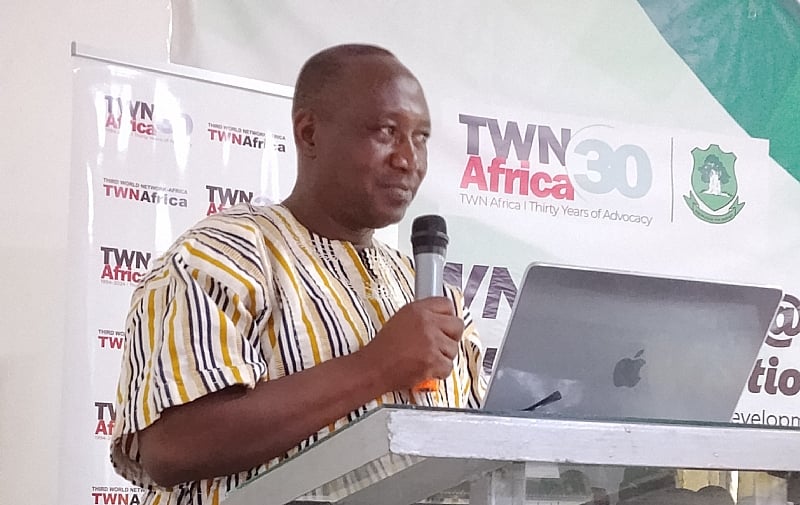Ghana’s Extractive Industries: A Call for Responsible Resource Management and Community-Centric Development
The Faculty of Communication and Media Studies (FCMS) at the University for Development Studies (UDS) recently convened a public lecture to address the crucial issue of responsible resource extraction in Ghana. The lecture, organized in collaboration with Third World Network (TWN)-Africa, focused on the urgent need for a national consensus on leveraging Ghana’s natural resources for sustainable economic development while prioritizing community welfare and environmental protection. This collaborative effort underscores a growing awareness of the complex interplay between economic development, environmental sustainability, and community well-being in the context of resource extraction.
The keynote speaker, Prof. Jasper Abembia Ayelazuno, Dean of FCMS, emphasized the critical need for a comprehensive policy framework that prioritizes refining raw materials within Ghana and safeguards the well-being of communities impacted by mining activities. This emphasis on local processing aligns with the broader goal of value addition, enabling Ghana to capture a greater share of the economic benefits derived from its natural resources. He warned of the devastating consequences of unchecked illegal mining activities, advocating for a declaration of environmental emergency to mitigate the escalating threat to food security. Prof. Ayelazuno underscored the importance of robust policy implementation to ensure that resource management benefits the nation as a whole, rather than serving the interests of a select few. This call for equitable resource governance highlights the need for transparency and accountability in the management of extractive industries. He also highlighted the significant disadvantages faced by women in mining communities due to the disruption of their traditional livelihoods, such as gathering firewood, snails, and shea nuts, further stressing the importance of inclusive and community-sensitive resource management strategies.
Echoing concerns about the social and environmental costs of unchecked resource extraction, other speakers at the event highlighted the detrimental export of unrefined minerals. This practice, often referred to as the export of "dirty gold," deprives Ghana of the substantial economic benefits that could be accrued through value addition and local processing. It also diminishes the potential for job creation and industrial development within the country. The inequitable distribution of benefits from extractive activities was another key concern raised during the lecture. Community members, particularly those directly affected by mining operations, often bear the brunt of environmental damage and social disruption while receiving a disproportionately small share of the economic benefits. The lecture underscored the need for a more equitable distribution of resources and a greater emphasis on community participation in decision-making processes related to resource extraction.
The public lecture, themed "Ghana’s Economic Transformation and the Role of Extractives: Putting the Community at the Center of Ghana’s Transformation," served as a platform for a diverse group of stakeholders, including students, faculty, policymakers, civil society representatives, and industry players, to engage in constructive dialogue on the responsible management of extractive resources for sustainable national development. This multi-stakeholder approach highlights the importance of collaborative efforts and shared responsibility in addressing the complex challenges associated with resource extraction. Mr. Francis Yenbila, a leader of the Mining Watch Group in Nabdam, pointed to the ineffective enforcement of environmental and mining regulations as a major contributor to the destruction of smallholder farms in the area, further underscoring the need for stronger regulatory oversight and enforcement mechanisms.
Ms. Pauline Vande-Pallen, Programmes Officer at TWN-Africa, expressed confidence in Ghana’s capacity to effectively manage its resources, emphasizing the critical role of robust regulations and their effective implementation. This emphasis on regulatory effectiveness reinforces the need for clear and enforceable rules, along with the capacity to monitor and enforce compliance. She emphasized that community concerns must be integrated into national dialogues surrounding resource extraction, especially when extraction activities significantly impact local communities. The lecture served as an educational platform, informing students and faculty about the responsible utilization of extractive resources and the importance of community participation in decision-making processes.
The event emphasized the potential for mining to contribute positively to Ghana’s development, provided that proper certification and regulation are in place to safeguard the livelihoods of local communities. This perspective highlights the potential for a symbiotic relationship between resource extraction and community development, rather than a zero-sum game where one comes at the expense of the other. The discussions at the lecture revolved around the need for a balanced approach that considers both economic development and social and environmental sustainability, recognizing that these are intertwined and mutually reinforcing objectives. The call for responsible resource extraction in Ghana reflects a broader global trend towards sustainable development and the recognition that economic growth must not come at the cost of environmental degradation and social inequity. The emphasis on placing communities at the center of the development agenda underscores the importance of inclusive and participatory development processes that prioritize the well-being of those most directly impacted by resource extraction activities.
The public lecture provided a valuable forum for discussing these crucial issues and charting a path towards responsible resource management that benefits all Ghanaians. By emphasizing community engagement, transparent governance, and sustainable practices, the event contributed to building a national consensus on how best to leverage Ghana’s natural wealth for both present and future generations. This underscores the importance of ongoing dialogue and collaboration among various stakeholders in shaping a sustainable and equitable future for Ghana’s extractive industries.


